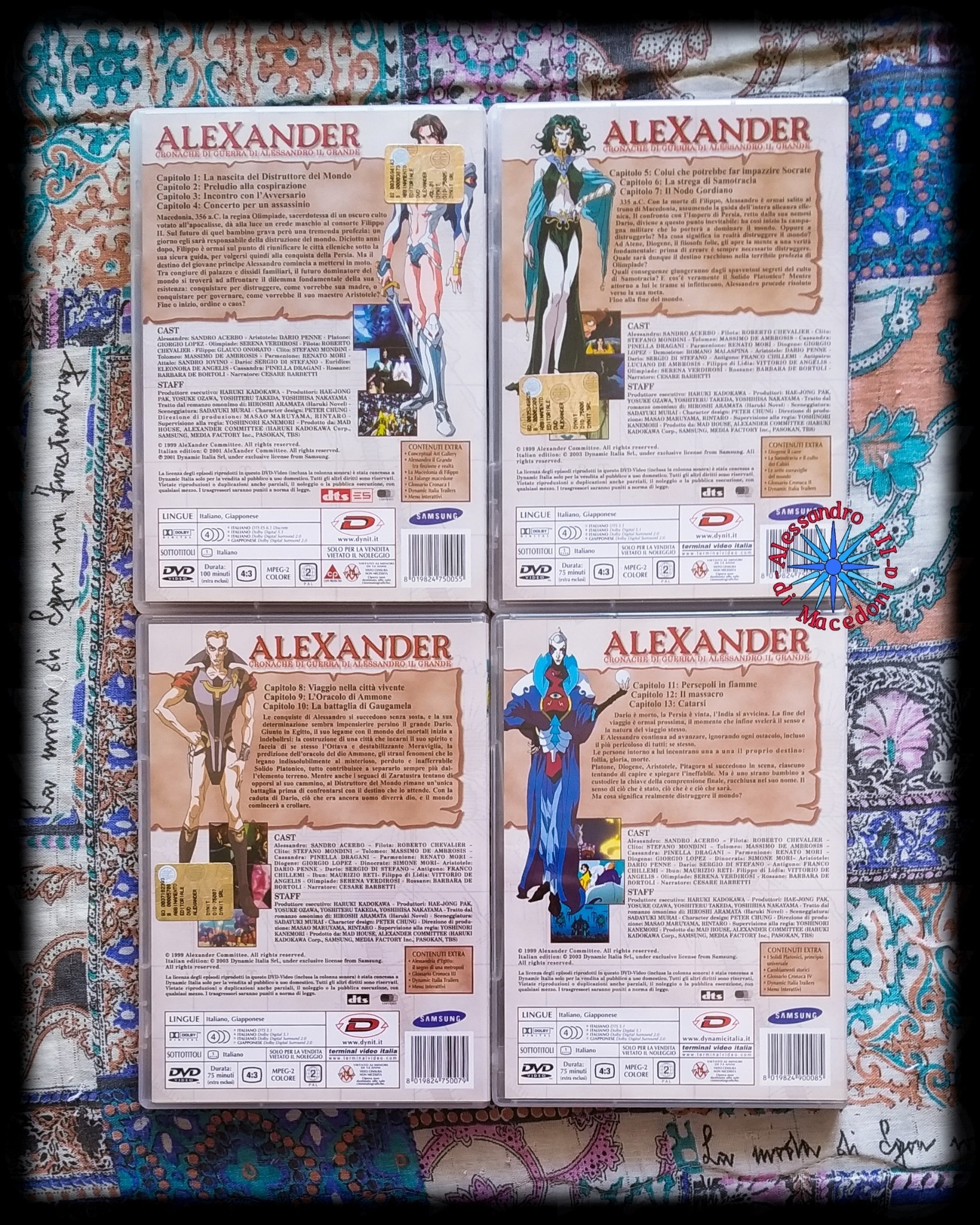Versione in ITALIANO: QUI.
Hello everyone, thank you for being on Alessandro III di Macedonia! Today is the third birthday of this blog-site-portal-container, call it whatever you prefer and it seems to me the best thing to celebrate it by talking to you about the anime that I watched for the first time on MTV Italy in 2000, which first intrigued me about Alexander’s life and which I reviewed for the umpteenth time last week.

Reign: The Conqueror
アレクサンダー戦記 (Alexander senki – Alexander – Cronache di guerra di Alessandro il Grande)
Writer: Hiroshi Aramata (novel)
Director: Yoshinori Kanemori
Writer: Sadayuki Murai
Char. design: Peter Chung
Music: Ken Ishii
Studio: Madhouse
Original network: WOWOW
Original run: September 14, 1999 – December 7, 1999
Episodes: 13 (complete) (runtime about 24 min.)


| Nº | English title (fonts: Wikipedia.it) Japanese 「Kanji」 – Rōmaji |
|---|---|
| 1 | A prophecy born this day 「Act.1:魔王誕生」 – act.1: maō tanjō |
| 2 | The thunder of battle 「Act.2:陰謀の序曲」 – act.2: inbō no jokyoku |
| 3 | A failure of diplomacy 「Act.3:魔王邂逅」 – act.3: maō kaikō |
| 4 | Ascension to the throne 「Act.4:暗殺の音階」 – act.4: ansatsu no onkai |
| 5 | God of creation 「Act.5:狂えるソクラテス」 – act.5: kurue ru sokuratesu |
| 6 | The secret of Samotrace 「Act.6:サモトラケの魔女」 – act.6: samotorake no majo |
| 7 | The Gordian Knot 「Act.7:ゴルディオのきびき」 – act.7: gorudeio nokibiki |
| 8 | Here shall stand Alexandria 「Act.8:魔都彷徨」 – act.8: mato hōkō |
| 9 | The oracle of Ammon 「Act.9:アモンの神託」 – act.9: amon no shintaku |
| 10 | Persia shall fall 「Act.10:ガウガメラの死闘」 – act.10: gaugamera no shitō |
| 11 | Unification before division 「Act.11:ペルセポリスの炎上」 – act.11: peruseporisu no enjō |
| 12 | The vanquished arise 「Act.12:虐殺行」 – act.12: gyakusatsu gyō |
| 13 | The prophecy comes to pass 「Act.13:カタルシス」 – act.13: katarushisu |
Macedonia, 356 BC Queen Olympias, priestess of an obscure cult devoted to the apocalypse, gives birth to a male heir to her consort Philip II. However, a terrible prophecy weighs on the future of that child: one day he will be responsible for the destruction of the world. Between palace conspiracies and family disagreements, the young prince Alexander, future ruler of the world, will face the fundamental dilemma of his existence: conquer to destroy, as his mother would like, or conquer to rule, as his teacher Aristotle would like? End or beginning? Order or chaos?
VVVVID.it, my translation
The anime was broadcast by MTV Italy in the late evening at the beginning of 2000, the DVD distribution is the work of Dynit (Italy) and the first time I saw it I became passionate about philosophy and Alexander but I didn’t understand much. However, there is greater understanding by looking at it and re-watching it, also given the many philosophical references. From the beginning I liked Reign: The Conqueror a lot for the magical-fantasty, futuristic, steam-punk transposition of Alexander’s life but I fully understood him knowing the philosophy, Alexander the Great and re-watching it. Not that to be understood you need to have special knowledge, but it’s not the classic anime that children would watch because it’s not immediate. Indeed children would look at it as a sort of futuristic cartoon without understanding it, but the vision is not suitable given the nude scenes and raw war scenes.
Drawings, music, subjects and scenarios are captivating: the tall and slender characters are designed by the South Korean Peter Chung already known for Æon Flux and are particular, innovative and unconventional because they deviate from the classic manga style but are detailed (this is one of the few souls, if not the only one, in which when the characters speak their chins also move and their mouths are not half-faced); Ken Ishii’s music is modern, electronic, particular for a story set more than 2000 years ago, but in my opinion the’re spot on because it gives a futuristic idea as was the vision of Alexander; the scenography is futuristic steam-punk, as well as the costumes, a distinctive feature that in my opinion is a good way to intrigue and update the story told to the public who doesn’t necessarily have to be passionate about history, indeed in this way it aims at the general public. As for the Italian dubbing is done very well, the dubbers have known voices, mature not as children, and their names are known to be the Italian voices of the most famous foreign actors. Alexander is voiced in Italian by Sandro Acerbo which gives him further depth and charisma, but watching it you will recognize many voices.
The various characters are well characterized and described and thanks to the costumes so eccentric and different from each other it’s also easy to recognize and identify them for the viewer who does’t know the story. On the one hand, Alexander has his mother who wants to convince him that he is the son of Zeus and will be the destroyer of the world and Philip, who as a great warrior has a “backward” mentality because he believes that the infantry is decisive in battles. The young man experiences this tension that comes to him from his parents and from the other he is intrigued and wants to test Aristotle’s knowledge and teachings not by taking them as dogmas, but by choosing how and what to think. In this series Alexander is a thoughtful, attentive, magnetic man, he doesn’t waste himself in useless words and is resolute in what he must do and has extremely clear ideas.
The authors insert in the anime a philosophical background that isn’t immediately understandable which is a further distinctive trait of the series. It’s possible to mark the anime in its philosophical and mathematical implications, but to understand it one must take a further step that not everyone wants/can do of research or effort of understanding. I believe that in this sense the special contents – which are only explanatory texts – contained in the 4 DVDs that make up the Chronicles are very useful and important. This philosophical part that for many today may seem an unnecessary forcing, instead, gives depth and further union to the plot of the series.
The prophecy says that the son of Olympias will be the destroyer of the world sets in motion the Pythagorean mathematicians, the Zoroastrians and the Brahmins to eliminate Alexander’s bad numbers from the world by killing him. The connection between these schools of thought and these followers may seem forced, but the authors refer to theories and studies according to which, for example, Zoroaster-Zarathustra was a teacher of Pythagoras, whose philosophy derives from Brahmanism. But the destruction spoken of in the anime can also be defined as change when viewed in a positive sense. From the philosophical-mathematical point of view, after Aristotle we moved on to Euclidean mathematics, which is why the Platonic Solid, that is the instrument that would give a total understanding of the universe, so sought by Aristotle is found by the young Euclid when he lives in Alexandria in Egypt and Aristotle begins to lose his memory in the future. The “destruction” of the world in the anime doesn’t begin after the victory over the Jhelum against Porus and the trap of Mirabilia, but after the fall of Darius in Gaugamela because there the Platonic Solid manifests and disperses and is from that moment that in reality Alexander had definitively conquered the immense Persian Empire becoming powerful and unbeatable and starting to make the changes he wanted. After Alexander the world of the Greek poleis definitively waned to make room for the Hellenistic rulers who will be hereditary monarchies, so the circle of intellectuals and scholars within each Greek city will no longer matter. After Alexander the world was no longer the same, the old world closed around the small mare nostrum expanded, opening up and including the Islamic “barbarians”, the other. Never before has there been a mixture of Greco-Roman and Asian cultures. Even the Pythagoreans who interfere in the battle of Issus and whom Darius decides to postpone in order not to have external interference during the battle, are here flying shapeshifters and can be made like this because according to their school of thought it was through numbers that could be modified playing with reality and they knew them very well. The superiority of Darius’s army is shown here through technological tools that might look like modern tanks and the like. Roxane is portrayed here as a beautiful blue-eyed and blond-haired woman, to reflect the ideal of beauty in the Western conception.
In the third episode, Alexander and his companions make a foray into Babylon to wreck the agreements between the ambassadors of Athens and Darius. So, in short, Alexander freeing Ptolemy meets Darius for the first time and thanks to this modification the plot is more united, the viewer sees a motivation for revenge and revenge that pushes him to continue the vision, while if the authors had followed history would lack this element of union. In addition, thanks to this episode the authors show the fidelity and friendship that Alexander felt towards his closest friends. Another element of union of the plot is that in this episode Alexander knows Roxane and from there the two will have love at first sight. The battle on the Jhelum river against Porus in the last episode takes on the characteristics of a battle against zombies in the anime, of the revived because Alexander fell into the Trap of Mirabilia, organized by the Brahmins and the Pythagoreans and ours must face all the armies already defeated and killed, because “he who is destined to destroy the world will be killed by whoever killed him”. Alexander will have to fight against himself, in a certain sense against his will in reality to continue the journey to the East and, winning, decides to go back to Babylon, unconquered and more powerful than ever.
All these changes – and others – at first glance may seem like departures from the story, but when compared and contextualized in the anime they represent reality well. Even the modification of the Argead star – which here has 12 rays and not 16 – seems to me a visual lightening of the Macedonian coat of arms to make it stand out better. The anime is also studded with historically lived and relevant characters for the story of Alexander the Great: the orator Demosthenes who will publish the Philippics in attack on Macedonian politics; the cynical Diogenes who lived in the barrel; Plato; Bessus; Satibalzane (Satibarzane); Darius; Pythagoras; Euclid; Altalos and many others. All this to tell you that the changes inserted weren’t made out of ignorance but for choices for the purpose of smoothness and union of the plot.
There are three scenes that I really enjoyed and are my favorites of the series: Alexander’s meeting with Diogenes, the cutting of the Gordian Knot and the founding of Alexandria. In the first, not only is the dialogue between Alexander and the philosopher beautiful, but also the opening lines between the latter and Philotas. The Gordian Knot scene is reinforced by Alexander’s further motivation to take the doctor Philip with him and is nice to see how Ptolemy – in this series he is the most dreamy, naive, spontaneous, fearful and least warrior of Alexander’s companions – tried in vain to untie the knot without taking liberty on the technique to use to untie it. The foundation of Alexandria, infact, is fascinating because it casts a glance on the future and on today’s city.
Another element I appreciated very much is that Alexander’s companions, although they have doubts or hesitations about him, die to protect their king, so Philotas and Cleitus, in different ways, more or less close to what really happened, decide here to sacrifice himself in the name of admiration and fidelity to the Conqueror. Philotas, even if tormented by nightmares for what his father revealed to him, decides to sacrifice himself by being stoned and doesn’t let Alexander intervene in his defense. Cleitus manifests doubts, especially after the death of Philotas, with Cassandra (here female and nephew of Aristotle. Yes female, there must be at least one woman among the main characters to balance relations a little), but doesn’t hesitate to protect Alexander sacrificing himself.
If you have never seen this anime I can only advise you to buy it online because the italian 4 DVD box set costs very little (but it hasn’t English dubbing) and it’s a work on Alexander that deserves to be seen and reviewed. After 21 years from the first time I saw it, it stuck with me and has a particular meaning for me. You can also find all the quotes of the series at THIS LINK (in Italian)!
Happy birthday Alessandro III di Macedonia and thank you all for continuing to read me,






2 pensieri su “Review: “Reign: The Conqueror” (1999)”